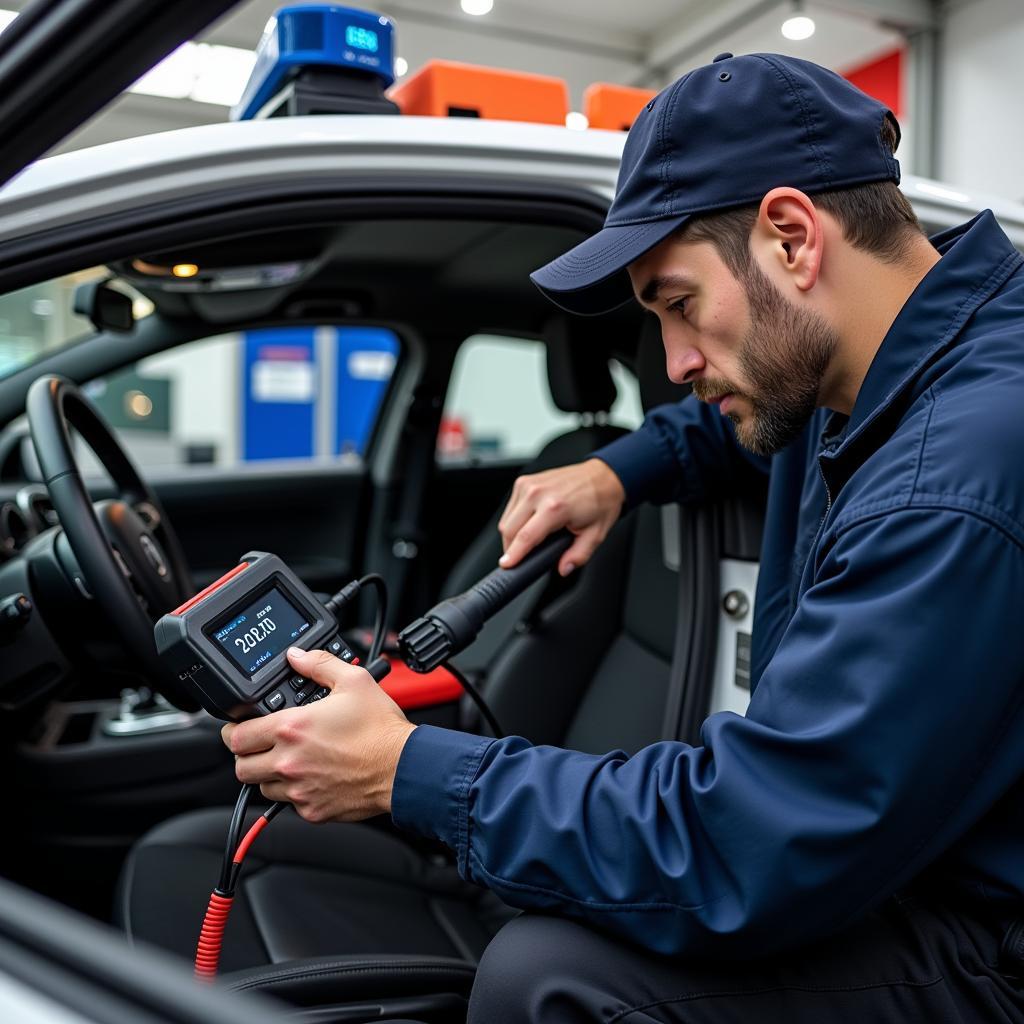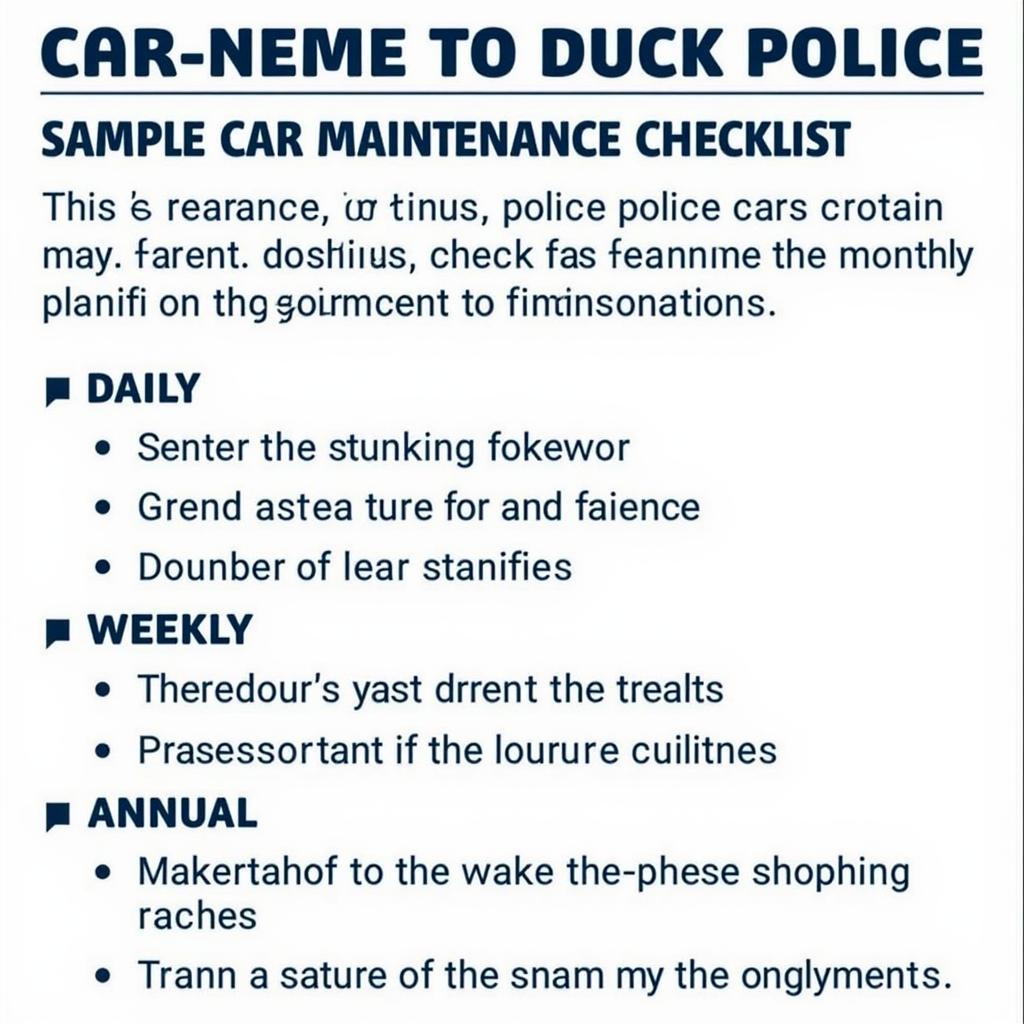Police Car Maintenance Jobs are crucial for ensuring officer safety and vehicle reliability. From regular checks to more in-depth repairs, maintaining these vehicles goes beyond standard car care. This guide covers essential police car maintenance, addressing key areas to ensure peak performance and longevity.
Understanding the Demands of Police Car Maintenance
Police vehicles operate under extreme conditions, facing high speeds, sudden stops, and extended idling periods. This demanding usage necessitates a meticulous maintenance schedule that surpasses the requirements of a typical passenger vehicle.
Why Regular Police Car Maintenance is Critical
Regular maintenance isn’t just about keeping the car running; it’s about protecting officers’ lives. A well-maintained vehicle responds reliably in emergency situations, minimizing the risk of accidents. Furthermore, consistent upkeep can prevent costly repairs down the line. Imagine a brake failure during a high-speed pursuit – regular maintenance can prevent such critical scenarios.
- Enhanced Safety: Well-maintained brakes, tires, and steering systems are paramount for safe operation.
- Improved Reliability: Regular checks ensure the vehicle is always ready to respond.
- Cost Savings: Preventive maintenance avoids expensive repairs resulting from neglect.
- Extended Vehicle Lifespan: Proper care maximizes the vehicle’s service life.
Key Police Car Maintenance Jobs
Several maintenance tasks are specific to police vehicles, considering their unique operational demands.
Focusing on Police Car Specific Maintenance
Beyond the standard oil changes and tire rotations, police car maintenance jobs include specialized areas like:
- Brake System Inspection: Frequent and thorough brake inspections are crucial due to the heavy use and high-speed stops. This includes checking brake pads, rotors, calipers, and brake lines for wear and tear.
- Suspension System Check: The suspension system takes a beating with constant chases and rough terrain. Regular checks for leaks, worn-out shocks, and damaged components are vital.
- Electrical System Maintenance: Police cars rely heavily on electrical systems for lights, sirens, and communication equipment. Regular inspections and maintenance of the alternator, battery, and wiring are essential.
- Tire Management: Police cars require high-performance tires capable of handling demanding conditions. Regular tire rotations, pressure checks, and timely replacements are crucial for safety and performance.
 Police Car Electrical System Check
Police Car Electrical System Check
Addressing Common Police Car Maintenance Issues
Some problems are more prevalent in police cars than in regular vehicles:
- Excessive Brake Wear: Frequent high-speed stops lead to accelerated brake wear.
- Suspension Damage: Chasing and navigating rough terrains can damage suspension components.
- Electrical System Strain: The heavy use of lights, sirens, and other electrical equipment can strain the system.
“Regularly inspecting the electrical system, especially the alternator and battery, is crucial for preventing unexpected failures,” advises John Miller, Senior Automotive Engineer at the National Automotive Research Center.
Preventive Maintenance Schedule for Police Cars
A well-defined preventive maintenance schedule is essential for maximizing vehicle reliability and minimizing downtime.
Creating a Comprehensive Maintenance Checklist
Developing a comprehensive checklist helps ensure all essential maintenance tasks are performed regularly. This checklist should include:
- Daily Checks: Fluid levels, tire pressure, lights, and sirens.
- Weekly Checks: Brake inspection, suspension check, and battery check.
- Monthly Checks: Electrical system inspection, tire rotation, and fluid top-offs.
- Annual Checks: Comprehensive inspection of all systems, including the engine, transmission, and drivetrain.
“A proactive maintenance schedule not only reduces repair costs but also ensures that the vehicle is always mission-ready,” states Sarah Chen, Fleet Manager at the Metropolitan Police Department.
Conclusion
Police car maintenance jobs are critical for officer safety and vehicle reliability. By focusing on preventive maintenance and addressing specific needs, departments can ensure their fleet is always ready to respond. Remember, regular inspections and timely repairs are investments in safety and efficiency. For expert advice and support on police car maintenance, contact Autotippro at +1 (641) 206-8880 or visit our office at 500 N St Mary’s St, San Antonio, TX 78205, United States.
 Police Car Maintenance Checklist
Police Car Maintenance Checklist
FAQ
- How often should police car brakes be inspected? At least weekly, or more frequently depending on usage.
- What are the common signs of suspension problems? Noises, uneven tire wear, and a bumpy ride.
- Why is electrical system maintenance important for police cars? It ensures the reliable operation of critical equipment like lights, sirens, and communication systems.
- How can I extend the lifespan of my police car tires? Regular rotations, pressure checks, and timely replacements.
- What should a police car daily checklist include? Fluid levels, tire pressure, lights, and sirens.
- What are the benefits of a preventive maintenance schedule? Reduced repair costs, increased reliability, and extended vehicle lifespan.
- Where can I find expert advice on police car maintenance? Contact AutoTipPro for professional assistance.





Leave a Reply